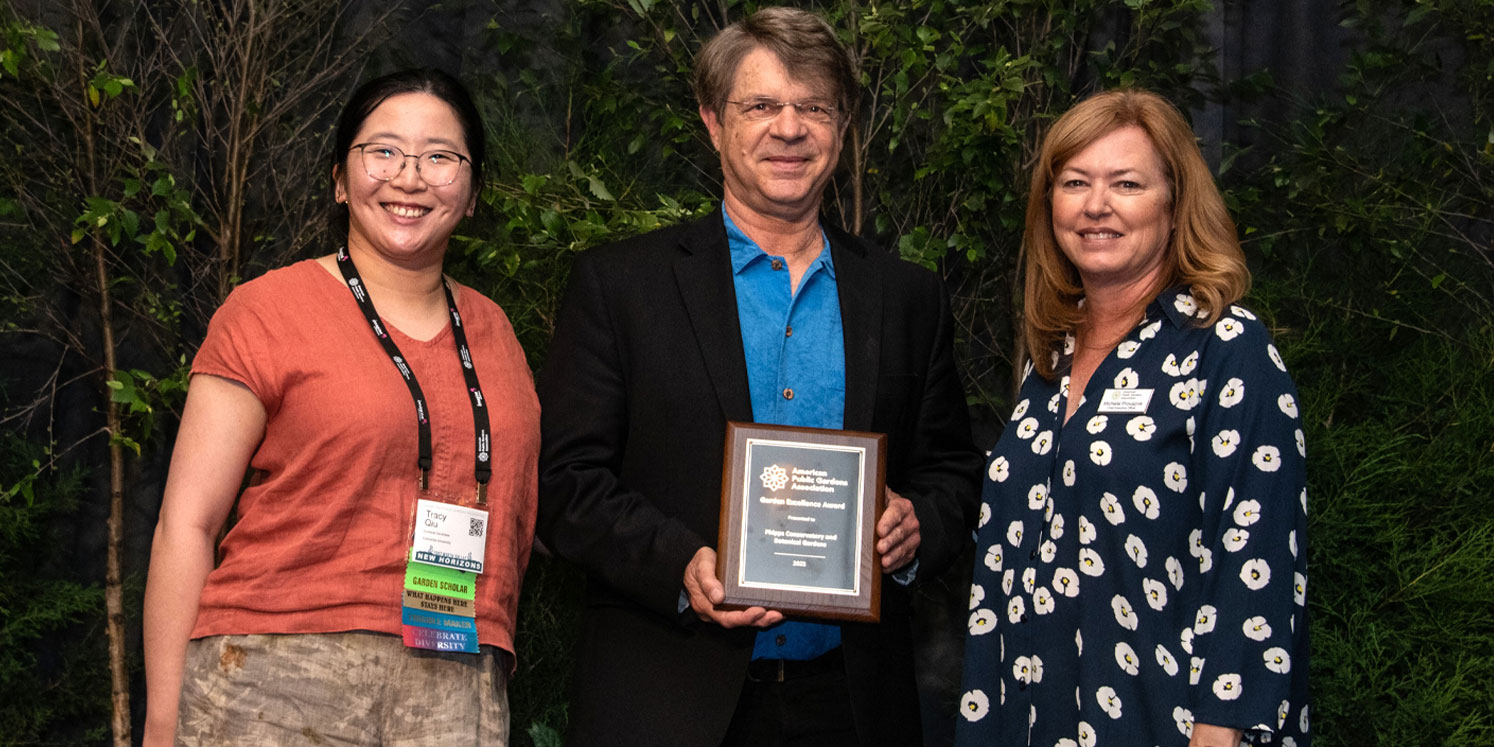Phipps Conservatory Receives Award for Garden Excellence from American Public Gardens Association
For Immediate Release: Thurs., June 15
Contact: Joe Reed | Senior Director of Communications
412-622-6915, ext. 3801 | jreed@phipps.conservatory.org
Phipps Conservatory Receives Award for Garden Excellence from American Public Gardens Association
Commitment to Sustainability Gains Recognition at Annual Conference
Pittsburgh, PA – Phipps Conservatory and Botanical Gardens received The Award for Garden Excellence at the 2023 American Public Gardens Association (APGA) Annual Conference held in Fort-Worth, TX, on June 5 – 8. The award, accepted by Phipps President and CEO Richard Piacentini, recognizes impeccable garden excellence and a commitment to supporting and demonstrating best garden practices.
Since 2003, the Award for Garden Excellence, one of APGA’s highest awards, has recognized gardens across America for their commitment to best garden practices. Phipps’ recognition is a result of the Conservatory demonstrating and providing an abundance of ways for guests, employees and colleagues to learn about exemplary sustainable practice and environmentally informed horticulture, plant collections and display, and garden design.
Phipps’ sustainable journey began in 2005 with the construction of the LEED® Silver Welcome Center, the first LEED® certified visitor center in a public garden and continued in 2006 with the opening of its Production Greenhouse, the first greenhouse to get LEED certified, earning LEED® Platinum for Existing Buildings: Operations and Maintenance, and the Tropical Forest Conservatory, one of the most energy efficient conservatories whose revolutionary design eliminates the greenhouse effect. In 2012, Phipps opened the Center for Sustainable Landscapes, a net-positive energy building which is the only building in the world to achieve seven of the world’s highest green certifications: Living Building Challenge, LEED® Platinum, SITES™ Platinum, Zero Energy Certification, WELL Platinum, BREEAM Outstanding In-Use and Fitwel 3 Stars. This was followed by two further net-positive energy facilities, the modular Nature Lab classroom and the adapted reuse Exhibit Staging Center, all located on a Platinum Sustainable SITES Initiative 3-acre site featuring a thriving ecosystem on a restored brownfield with 100 plant species all native from within 200 miles of Pittsburgh.
Since 2005, Phipps has purchased 100% renewable electricity for the entire campus through the PA Power Switch program for electricity demand beyond what is generated by renewables on-site. Since 2005, carbon emissions for heating, per square foot have been reduced by 56%, far surpassing the Paris Agreement’s 26 – 28% reduction target. To encourage the public to follow its lead, Phipps launched the Make the Switch at Phipps! Green Power Drive. To date, more than 6,500 families have switched to green power while visiting and have prevented 50,000 tons of CO2 emissions each year — the equivalent to saving over 100,000 barrels of oil from being burned, or 120 million miles from being driven in an average passenger car, annually.
To make an impact beyond its own garden, Phipps launched The Climate Toolkit in 2020 to help gardens, museums and zoos address climate change; to date, 93 institutions serving more than 57,000,000 annual visitors have joined the Climate Toolkit.
To learn more about Phipps’ sustainability leadership and commitment, visit phipps.conservatory.org/CSL10.
###
About Phipps: Founded in 1893, Phipps Conservatory and Botanical Gardens in Pittsburgh, PA is a globally recognized green leader with a mission to inspire and educate all with the beauty and importance of plants; to advance sustainability and promote human and environmental well-being through action and research; and to celebrate its historic glasshouse. Encompassing 15 acres including a historic 14-room glasshouse, 23 distinct indoor and outdoor gardens and industry-leading sustainable architecture and operations, Phipps attracts more than half a million visitors annually from around the world. Learn more at phipps.conservatory.org.
Watch TEDx: What We Can Learn From an Old Glasshouse: A look at the evolving way we connect people to nature at Phipps, demonstrate how human and environmental health are inextricably connected, and show that to age gracefully, we must continually reinvent ourselves to evolve with the rest of the world.



